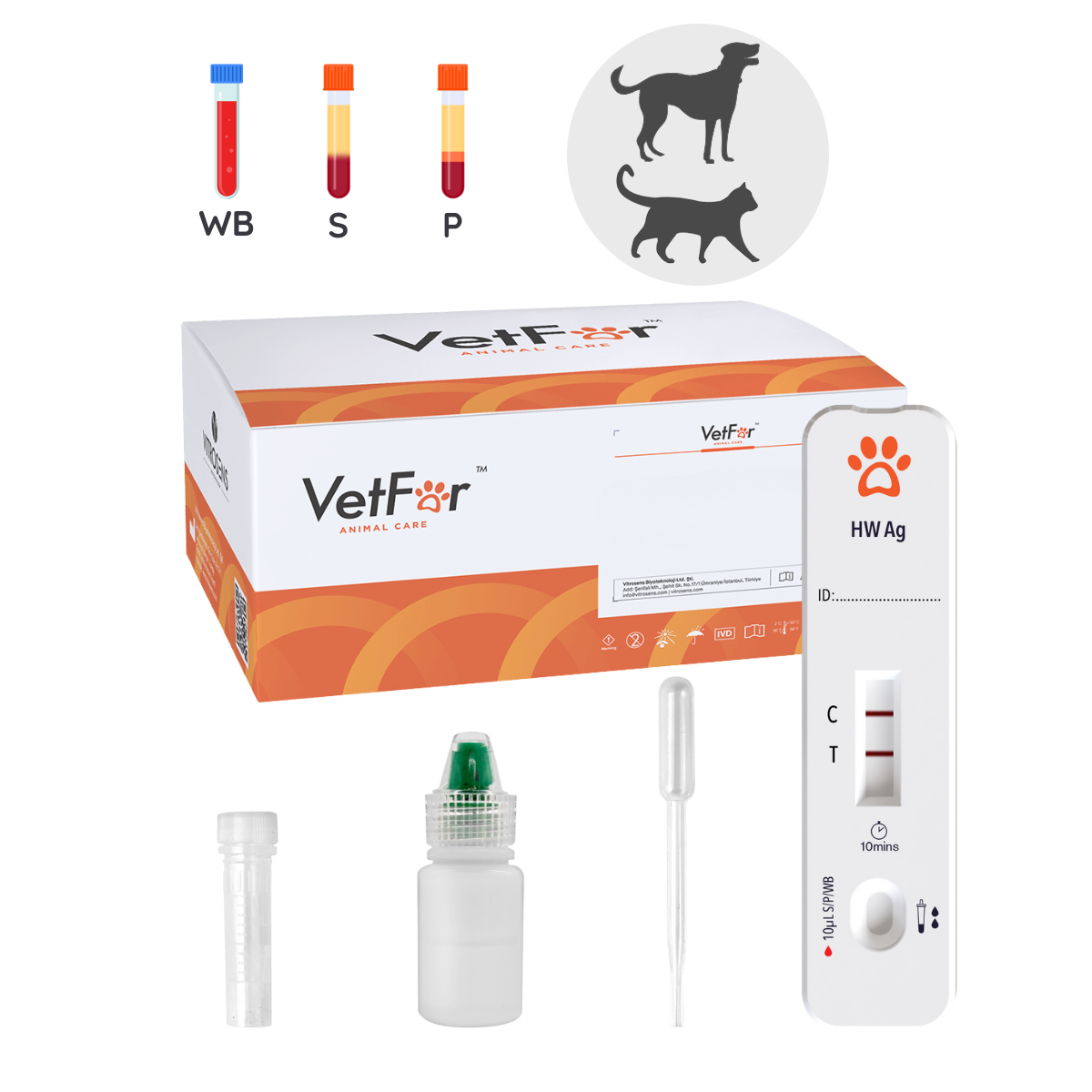Heartworm (HW) Antigen Test
This test is intended for the rapid detection of specific antigens against Dirofilaria immitis (heartworm) in whole blood, serum or plasma samples from dogs and cats.
55,80 €
| Quantity | Price | Discount |
|---|---|---|
| 3-5 | 54,13 € | 3% |
| 6-9 | 52,45 € | 6% |
| 10+ | 50,22 € | 10% |
| Sample type |
Plasma ,Serum ,Whole blood |
|---|---|
| Target specie |
Canine (Dog) ,Feline (Cat) |
| Target |
Heartworm (HW) |
| Packaging unit |
10 Tests |
| Sensitivity |
97,96 % |
| Specificity |
100 % |
The VetFor™ Heartworm (HW) Antigen Rapid Test is a lateral flow sandwich test for the qualitative detection of heartworm antigens (Dirofilaria immitis) in whole blood, serum or plasma samples from dogs and cats. The test kit contains all the necessary components to perform a simple and accurate test and is intended for in vitro veterinary diagnostic use only.
Product details
- Test type: Lateral flow sandwich immunoassay
- Target parameter: Heartworm antigen (Dirofilaria immitis)
- Sample material: Whole blood, serum or plasma from dogs and cats
- Result time: Rapid test with direct evaluation after 10 minutes
- Cross-reactivity: No cross-reactivity with the following pathogens detected: Canine Distemper Virus (CDV), Canine Herpesvirus (CHV), Leishmania infantum, Babesia canis, Toxoplasma gondii
- Storage conditions: 2 – 30 °C
Performance data
-
Sensitivity: 97,96 %
-
Specificity: 100 %
-
Accuracy: 98,92 %
Content
- 10 test cassettes (1 test/bag)
- 10 disposable plastic droppers
- 10 tubes with EDTA
- 2 bulk bottles with diluent
- 1 instruction manual
For professional use only!
SHELF LIFE AND STORAGE
- The test kit must be stored at a temperature between 2 °C and 30 °C and a relative humidity of 40% to 60%. All components must be brought to room temperature before testing.
- Do not open sealed pouches and test kits until immediately before use.
- The test is stable until the expiration date. Do not use the test kit after the expiration date. The expiration date is indicated on the label/packaging of the sealed foil pouch.
- Do not expose the test kit to direct sunlight.
NOTES
- For in vitro diagnostic use only.
- For optimal test results, the manufacturer's instructions should be followed precisely.
- The tests should be conducted in compliance with biosafety measures and with protective clothing.
- The test kits must be kept in their sealed packaging until use.
- Do not use the test kit if the pouch is damaged or the seal is broken.
- The components of the test kit must not be reused.
- All components must be brought to room temperature before testing.
- The test kit may only be used up to the indicated expiration date.
- The components of this test kit have been tested as a standard batch.
- Do not exchange or mix components from different test kits.
- Do not touch the uncovered areas of the membrane in the test cassette.
- Inadequate or incorrect sample collection as well as improper storage and transport conditions may falsify the test results.
- All components of the test kit should be disposed of as infectious material.
You must be logged in to post a review.
Dirofilaria immitis, also known as heartworm, is a parasitic roundworm that causes the so-called heartworm disease (dirofilariasis) in dogs and occasionally in cats worldwide. Adult worms prefer to settle in the right ventricle and the pulmonary artery, and if left untreated, can lead to severe health damage such as pulmonary hypertension, heart failure, and organ damage.
Transmission and Life Cycle
Transmission occurs through mosquitoes (e.g., Aedes, Anopheles, Culex), which ingest microfilariae during blood feeding and later transmit infective larvae to other animals. After infection, the larvae migrate through the host's tissues and develop into adult worms in the blood vessels — a process that takes about 6–7 months in dogs and 7–9 months in cats.
Symptoms
In dogs: Chronic cough, decreased stamina, shortness of breath, weight loss; in advanced cases: heart failure, effusions.
In cats: Often asymptomatic or sudden death, coughing, shortness of breath, vomiting, neurological symptoms, FIP-like progression.
Diagnosis
Diagnosis is based on:
- Antigen rapid tests (e.g., VetFor™ Heartworm Test Kit)
- Detection of microfilariae in blood smears or via the Knott test
- Imaging (cardiac ultrasound, X-ray)
Treatment
In dogs: Antiparasitic drugs such as melarsomine, possibly combined with doxycycline (to target Wolbachia bacteria). Additionally: corticosteroids to reduce inflammation.
In cats: Treatment is symptomatic, as adulticide therapy is risky. Prevention is especially important in cats.
References
- ESCCAP Germany. (n.d.). Heartworms in Dogs: Dirofilaria immitis. Available at: https://www.esccap.de/parasiten/sand-und-stechmuecken/herzwuermer-beim-hund
- Tiermedizinportal. (2023). Heartworm Disease (Dirofilariasis) in Dogs. Available at: https://www.tiermedizinportal.de/tierkrankheiten/hundekrankheiten/herzwurmkrankheit-dirofilariose-beim-hund
- Royal Canin – Vet Focus. (n.d.). Lungworms and Heartworms in Cats. Available at: https://vetfocus.royalcanin.com/de/wissenschaft/lungenwurmer-und-herzwurmer-bei-katzen
- Veteri.de. (2023). Dirofilariasis (Heartworm Disease) in Dogs. Available at: https://www.veteri.de/hunde/gesundheit-hund/hundekrankheiten/dirofilariose-herzwurmkrankheit-beim-hund
translated from German version




Reviews
Clear filtersThere are no reviews yet.